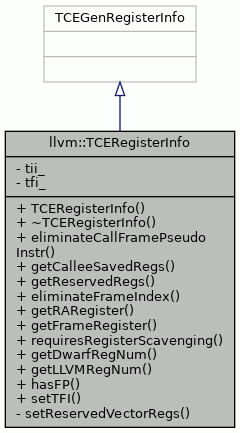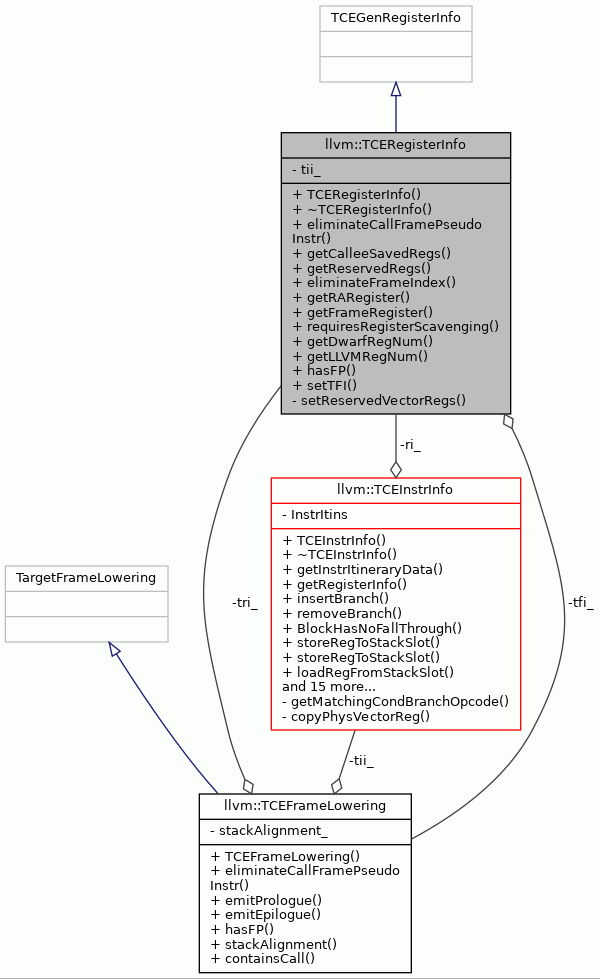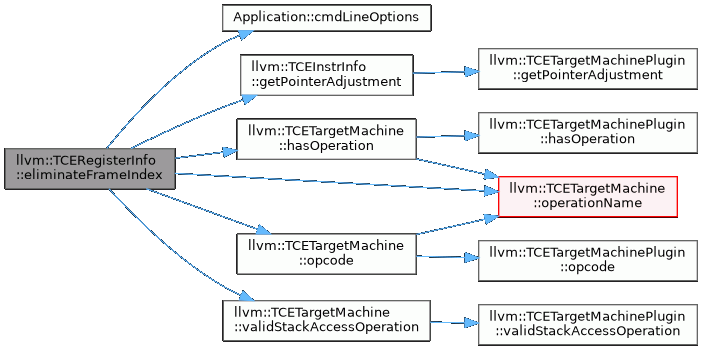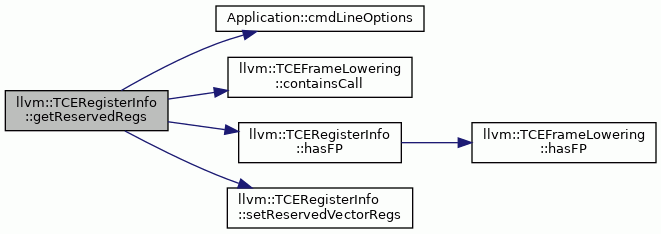#include <TCERegisterInfo.hh>


Public Member Functions | |
| TCERegisterInfo (const TargetInstrInfo &tii) | |
| virtual | ~TCERegisterInfo () |
| void | eliminateCallFramePseudoInstr (MachineFunction &MF, MachineBasicBlock &MBB, MachineBasicBlock::iterator I) const |
| const MCPhysReg * | getCalleeSavedRegs (const MachineFunction *MF=0) const override |
| BitVector | getReservedRegs (const MachineFunction &MF) const override |
| bool | eliminateFrameIndex (MachineBasicBlock::iterator II, int SPAdj, unsigned FIOperandNum, RegScavenger *RS=NULL) const override |
| unsigned | getRARegister () const |
| Register | getFrameRegister (const MachineFunction &mf) const override |
| bool | requiresRegisterScavenging (const MachineFunction &) const override |
| int | getDwarfRegNum (unsigned regNum, bool isEH) const |
| int | getLLVMRegNum (unsigned int, bool) const |
| bool | hasFP (const MachineFunction &MF) const |
| void | setTFI (const TCEFrameLowering *tfi) |
Private Member Functions | |
| void | setReservedVectorRegs (llvm::BitVector &reserved) const |
Private Attributes | |
| const TargetInstrInfo & | tii_ |
| const TCEFrameLowering * | tfi_ |
Detailed Description
Class which handles registers in the TCE backend.
Definition at line 53 of file TCERegisterInfo.hh.
Constructor & Destructor Documentation
◆ TCERegisterInfo()
| TCERegisterInfo::TCERegisterInfo | ( | const TargetInstrInfo & | tii | ) |
The Constructor.
- Parameters
-
st Subtarget architecture. tii Target architecture instruction info.
Definition at line 82 of file TCERegisterInfo.cc.
◆ ~TCERegisterInfo()
|
inlinevirtual |
Definition at line 56 of file TCERegisterInfo.hh.
Member Function Documentation
◆ eliminateCallFramePseudoInstr()
| void llvm::TCERegisterInfo::eliminateCallFramePseudoInstr | ( | MachineFunction & | MF, |
| MachineBasicBlock & | MBB, | ||
| MachineBasicBlock::iterator | I | ||
| ) | const |
◆ eliminateFrameIndex()
|
override |
Definition at line 131 of file TCERegisterInfo.cc.
References ADDIMM, assert, Application::cmdLineOptions(), llvm::TCEInstrInfo::getPointerAdjustment(), llvm::TCETargetMachine::hasOperation(), INTEGER_REG_CLASS, llvm::TCETargetMachine::opcode(), llvm::TCETargetMachine::operationName(), options, THROW_EXCEPTION, and llvm::TCETargetMachine::validStackAccessOperation().

◆ getCalleeSavedRegs()
|
override |
Returns list of callee saved registers.
Definition at line 92 of file TCERegisterInfo.cc.
References hasFP().

◆ getDwarfRegNum()
| int llvm::TCERegisterInfo::getDwarfRegNum | ( | unsigned | regNum, |
| bool | isEH | ||
| ) | const |
◆ getFrameRegister()
|
override |
Definition at line 416 of file TCERegisterInfo.cc.
References hasFP().

◆ getLLVMRegNum()
| int llvm::TCERegisterInfo::getLLVMRegNum | ( | unsigned int | , |
| bool | |||
| ) | const |
◆ getRARegister()
| unsigned TCERegisterInfo::getRARegister | ( | ) | const |
Re-issue the specified 'original' instruction at the specific location targeting a new destination register.
- Parameters
-
mbb Machine basic block of the new instruction. i Position of the new instruction in the basic block. destReg New destination register. orig Original instruction.
void TCERegisterInfo::reMaterialize( MachineBasicBlock& mbb, MachineBasicBlock::iterator i, unsigned destReg, const MachineInstr* orig) const { assert(false && "It really was used"); MachineInstr* mi = mbb.getParent()->CloneMachineInstr(orig); mi->getOperand(0).setReg(destReg); mbb.insert(i, mi); } Not implemented: When is this method even called?
Definition at line 410 of file TCERegisterInfo.cc.
References assert.
◆ getReservedRegs()
|
override |
Returns list of reserved registers.
Definition at line 105 of file TCERegisterInfo.cc.
References assert, Application::cmdLineOptions(), llvm::TCEFrameLowering::containsCall(), hasFP(), options, setReservedVectorRegs(), and tfi_.

◆ hasFP()
| bool TCERegisterInfo::hasFP | ( | const MachineFunction & | MF | ) | const |
Definition at line 425 of file TCERegisterInfo.cc.
References llvm::TCEFrameLowering::hasFP(), and tfi_.
Referenced by getCalleeSavedRegs(), getFrameRegister(), and getReservedRegs().

◆ requiresRegisterScavenging()
|
override |
Definition at line 430 of file TCERegisterInfo.cc.
◆ setReservedVectorRegs()
|
private |
Referenced by getReservedRegs().
◆ setTFI()
|
inline |
Definition at line 84 of file TCERegisterInfo.hh.
References tfi_.
Referenced by llvm::TCEFrameLowering::TCEFrameLowering().
Member Data Documentation
◆ tfi_
|
private |
Definition at line 89 of file TCERegisterInfo.hh.
Referenced by getReservedRegs(), hasFP(), and setTFI().
◆ tii_
|
private |
Definition at line 88 of file TCERegisterInfo.hh.
The documentation for this class was generated from the following files: